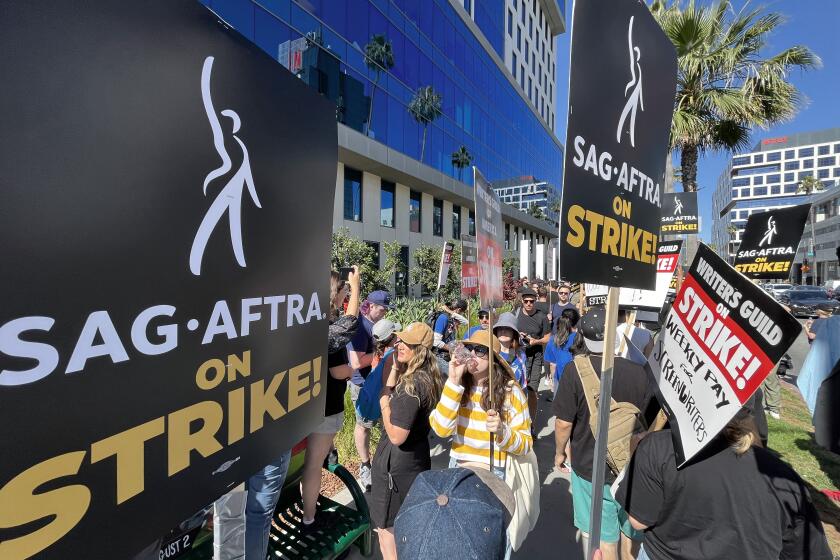Striking actors couldn’t promote our film, and it ‘flopped.’ We couldn’t be prouder

- Share via
Three weeks ago, we held our breath as our first feature, “Dumb Money,” came out in theaters around the world. We were hoping for a bang; we got more of a whimper. The debut came smack in the middle of the actors’ and writers’ strikes. Our film premiered to strong reviews (certified fresh!) and positive audience reaction at the Toronto International Film Festival, where scalpers sold tickets for upward of $900. After a two-week platform rollout, we landed in seventh place the weekend the film went wide. (One glimmer of hope: “Everything Everywhere All At Once” came in sixth on its wide release.)
A major factor in the box office is that we’ve had zero promotion from our cast — including Pete Davidson, Seth Rogen, Paul Dano, America Ferrera, Shailene Woodley, Nick Offerman and Sebastian Stan. We made the film independently, but Sony, our distributor, is a signatory of the Alliance of Motion Picture and Television Producers, which represents the studios, so the cast couldn’t promote the film at all, per Screen Actors Guild–American Federation of Television and Radio Artists strike rules.
Pete Davidson is hosting “Saturday Night Live” this weekend, but he can’t say a word about his surprisingly emotional turn in “Dumb Money.” Not even to discuss the character-driven nude scene he performs at the end. The missed opportunities to put butts in seats are endless. The silence on TikTok is deafening. As it should be.
The stakes of these strikes far overshadow individual consequences. That includes an experience we would not recommend: spending opening weekend reading tweets from viewers who loved watching our film … alone in their local theater.
We console ourselves with a simple observation. It is the message of our film and the message of the collective actions happening in Hollywood and around the country right now: This is about money, yes. But it is also about more than money.
Negotiations between actors union SAG-AFTRA and the Hollywood studios hit a snag Wednesday, ending with the AMPTP saying it had suspended negotiations.
These strikes are about business practices that have squeezed so many to enrich so few. They are about securing better contracts that pay fair wages. But they are also about a principle, one that goes to the heart of how we ascribe value as an industry and a society. People are coming together to say: “I deserve not just money for my labor, but also dignity. I will not be small or invisible any longer.” It costs money to make this point, and people are willing to spend it.
Look at the United Auto Workers. Nearly 5,000 autoworkers have been laid off since the strike began last month. But the UAW is holding strong because they’ve seen how the big three — Ford, General Motors and Stellantis — have raked in huge gains while workers’ wages have stagnated. Or take the International Brotherhood of Teamsters, the union which represents more than 300,000 UPS workers. The Teamsters narrowly avoided a strike this summer after drawing on rhetoric like “end part-time poverty” to notch protections for part-time workers, who make up more than half of the union’s UPS members. Job assurance means dignity for workers.

Residuals used to provide actors that dignity. Those have essentially vanished, and the unions’ efforts to undo that damage have been blamed for the breakdown in negotiations between SAG-AFTRA and the AMPTP earlier this week. The stakes of the strike even extend to who owns an actor’s literal body and voice, as technology now allows an actor’s image to be digitally repurposed ad infinitum. The fight could not be more personal.
People are coming together to demand money, yes. But just as important, they are demanding a moral reckoning in industries and institutions that have devalued regular people for so long. How else to explain this remarkable moment of labor solidarity in Hollywood and across the country? For many, the system feels broken.
Those were the same feelings that drove people to buy shares of GameStop back in 2021, at the height of the pandemic, as we dramatize in “Dumb Money.” It has been surreal, to say the least, to watch the story we told in our script suddenly play out all around us. To go from chronicling a collective action to participating in one. In the case of GameStop, a charismatic YouTuber named Keith Gill, who wore a red headband and went by the moniker Roaring Kitty, discovered that hedge funds had shorted more than 100% of the total available shares in the once-beloved video game store. The story quickly spread on social media. Billionaires were profiting from the failure of businesses and the loss of thousands of jobs. To many, it typified the worst of Wall Street: greed and impunity; the brand of careless capitalism that reduces companies to ticker symbols and bottom lines. So retail traders bought into GameStop and held, sending the stock soaring — and the hedge funds carrying shorts into steep losses. One of the rallying cries the retail traders used was HODL: hold on for dear life.
Starring Paul Dano as the likable, unassuming basement trader Keith Gill, director Craig Gillespie’s comedy turns a pandemic craze into a populist showdown.
Critics of our film, and the movement it depicts, don’t like to give retail traders this victory. They point out that many of them bought in too high or held on too long and ended up losing money: “Retail traders always lose!” It’s a blunt way of putting an actual statistic, which is that retail traders typically underperform the market. (Hedge funds do too, by the way, though that gets a lot less attention.)
These critics are not wrong. But they’re missing a larger point. They see success or failure only in terms of who made money and who lost. It’s akin to yelling at striking workers: “You could be making more as scabs!”
We interviewed dozens of retail traders to craft the screenplay for “Dumb Money,” and the biggest regret we heard was not that they bought too high or sold too late. It was from those who sold at all. Selling meant betraying the movement, and the movement was what mattered most. One investor told us that being part of the GameStop phenomenon was worth all the money he lost and then some. There was a value at stake, and he was willing to pay for it.
We are paying in Hollywood too, and it’s not just for the richest possible contract on the other side of these negotiations. It is the price of dignity, visibility, transparency — the very same values that drove so many to buy stock in an obscure video game store. We are already seeing the fruits of that sacrifice. The Securities and Exchange Commission on Friday announced new rules that force hedge funds to be more transparent about their short positions. Such a move is unlikely to have happened without the GameStop traders. (Is it too much to believe our movie may also have played a role?)
Audiences have continued to discover “Dumb Money” on their own, a slow burn that we hope is building into a movement. We held on for dear life through the writers’ strike and will continue to HODL in solidarity with the actors — even as it costs our film at the box office. Some may call that failure. If so, let them. It’s a failure we are proud of.
Rebecca Angelo and Lauren Schuker Blum have been a film and television writing team since 2012. The pair first met as reporters at the Wall Street Journal. During their time as journalists, they also wrote for the Economist, the New York Times and the Washington Post. Angelo and Blum’s first feature, “Dumb Money,” on which they also served as executive producers, chronicles the January 2021 GameStop short squeeze. Other upcoming projects include reuniting with “Dumb Money” director Craig Gillespie on “Cruella 2”; a feature biopic of talent agent Sue Mengers starring Jennifer Lawrence; adapting Michael Lewis’ New York Times bestselling book “The Premonition: A Pandemic Story”; and the theatrical feature adaptation of Golden Globe-winning and Emmy-nominated series “Murder, She Wrote.” For television, they are developing a show with Adam McKay for Netflix. Their previous writing credits include the Emmy-winning series “Orange Is the New Black.”
More to Read
Only good movies
Get the Indie Focus newsletter, Mark Olsen's weekly guide to the world of cinema.
You may occasionally receive promotional content from the Los Angeles Times.












